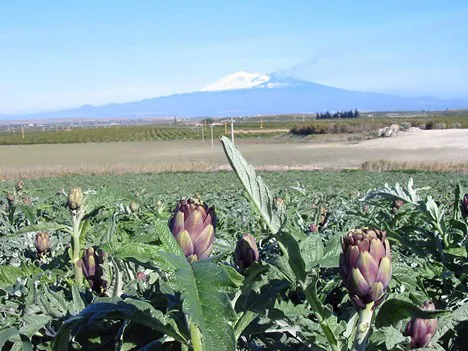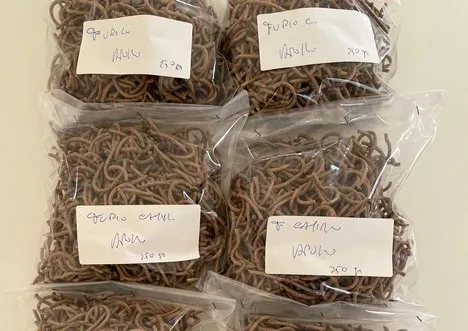The aim of the Fil.Pa.Nu. Project is to enhance the value of the end-of-harvest artichokes through a transformation process aimed at the production of a nutraceutical product. The project is promoted by an association with the scientific support of the Universities of Catania and Parma.

The Fil.Pa.Nu Project was presented during a webinar that took place on 26 November and was attended remotely by operators of the supply chain. The speakers were agronomist Santo Aparo, as an Innovation Broker, who explained the need "to develop an eco-sustainable supply chain for the production of pasta enriched with artichoke flour. It is necessary to significantly diversify the sector due to the growing attention of consumers towards industrial products obtained from eco-sustainable processes, as well as featuring nutraceutical and sensorial qualities".
 Pasta enriched with artichoke
Pasta enriched with artichoke
Sara Lombardo and Rosa Palmeri of the Department of Agriculture, Food and Environment (Di3A) of the University of Catania spoke on the eco-sustainable supply chain of nutraceutical pasta enriched with artichoke flour, focusing on the scientific purposes and on the structure of the project.
"The University of Catania has been involved in the implementation of process innovations aimed at improving the post-harvest treatment of artichoke heads (washing, refrigeration, drying and milling operations), in order to extend the shelf-life of the artichoke flour and also to recover the artichoke juice for alternative uses. The technical and scientific basis of Fil.Pa.Nu. project, related to the suggested innovations, have been acquired by us in previous projects related to the development of eco-sustainable agronomic practices for the Sicilian artichoke cultivation and the qualitative properties of artichoke heads, as documented by numerous national and international scientific publications,” said Professor Lombardo.
"As part of the project Fil.Pa.Nu. we are also working on validating the innovation process through the monitoring of the hygienic, sensory and nutraceutical characteristics of artichoke and wheat flours, and of pasta enriched with artichoke flour, in order to guarantee a quality product to the consumer in collaboration with the university spin-off 'High Materials Innovation s.r.l.' of Parma and the Azienda di Servizi alla Persona Istituzioni Assistenziali Riunite of Pavia," continued Professor Lombardo.
"More specifically, the collaboration with Professor Cristina Restuccia of Di3A of the University of Catania, is focused on the evaluation of artichoke flour as a functional ingredient in processed foods, such as pasta. In particular, the inhibitory efficacy on metabolic enzymes, responsible for glucose absorption, and the antimicrobial activity closely related to the shelf life of the product will be evaluated," added Professor Rosa Palmeri.
Professor Claudio Corradini of the Department of Chemical, Life and Environmental Sustainability Sciences of the University of Parma spoke on the subject of "fruit and vegetable-oligosaccharides (FOS) and fructo-oligosaccharides present in artichoke extracts". As a matter of fact, an added value of the project Fil.Pa.Nu. is the collaboration with the university spin-off High Materials Innovation s.r.l. of Parma and the Azienda di Servizi alla Persona Istituzioni Assistenziali Riunite of Pavia, which together with Di3A, are engaged in validating the proposed innovations, through a systematic monitoring of the nutritional and health properties of the semi-finished product (artichoke and wheat flour) and of the finished product (dried pasta enriched with artichoke flour).
Chef Pietro Leemann also contributed, focusing his report to the topic of "Healthy, sustainable and mindful cooking".
The event ended with a speech by Giuseppe Cupane, president of Coop. Violetto Ramacchese, in charge of the project, who spoke on Supply chain organization, diversification and birth of new businesses.
 Giuseppe Cupane
Giuseppe Cupane
"Despite being Italy’s backbone in the artichoke industry, Sicily still shows a lack of propensity for innovation in the production chain. This means that the heads are almost exclusively directed towards the fresh market and only the remaining production is destined for the processing industry. This limits local companies to penetrate national and foreign markets and, as a consequence, it limits the increase of income for operators. Therefore, we need process and product innovations aimed at defining eco-sustainable technical guidelines for the agricultural production management, and aimed at expanding the traditional use of the end-of-harvest heads and at enhancing the value of production waste," concluded Giuseppe Cupane.
